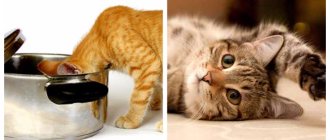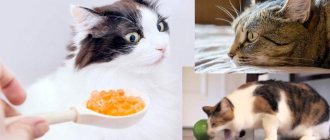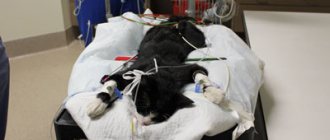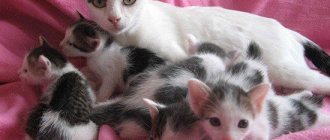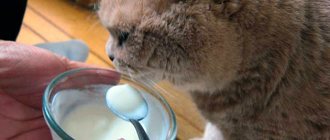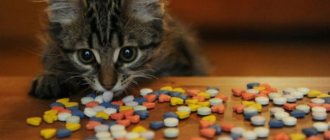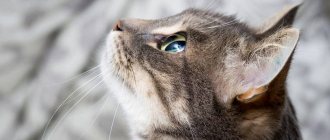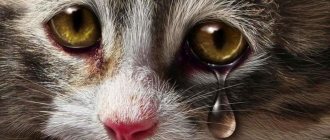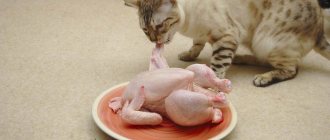12692Administration
A cat's diet before and after castration has significant differences. Changes in hormonal levels lead to obesity in castrates and the development of urolithiasis. Can a neutered cat be given fish? The animal's menu must be balanced in terms of protein, vitamins, microelements, and calories.
Cats and cats, if trained, get used to fish and can go on a “hunger strike”, demanding their favorite product. However, such nutrition is harmful for them, especially after castration, despite the prevailing stereotype of feeding pets.
Is it possible to feed?
Fish is a valuable food product for both humans and some animal species. It contains many proteins, amino acids that are beneficial for the body, as well as omega-3 and omega-6, which have a beneficial effect on the functioning of the cardiovascular, reproductive systems and musculoskeletal system.
However, eating fish can negatively affect your health. Veterinarians believe that this product, especially if fed to pets frequently and in large quantities, can lead to obesity, kidney problems and the rapid development of urolithiasis. This is especially true for spayed and neutered pets.
Castrated
Castration of a cat leads to the fact that the animal’s hormonal system weakens and becomes susceptible to various pathologies. Therefore, metabolism slows down.
Both owners and veterinarians note that neutered cats have an increased appetite and a risk of developing obesity. The rapid growth of adipose tissue contributes to fluid retention in the body, urine becomes more concentrated, and urination is impaired.
Fish contains large quantities of magnesium, potassium and phosphorus. With reduced hormonal levels and obesity, it is difficult for cats to get rid of excess of these substances in the body. Sand and stones appear in the urinary tract, and urolithiasis develops. Excess iodine, which is also found in fish products, leads to disturbances in the endocrine system.
Therefore, veterinarians are of the opinion that feeding cats fish is undesirable.
Sterilized
Sterilized cats, like castrated cats, have hormonal imbalances and may experience similar problems. Therefore, it is recommended that they be given only specialized food that is balanced in the content of microelements and does not lead to obesity.
In addition, it is undesirable to feed cats of any breed with fish products if they have the following diseases and conditions:
- proneness to allergies;
- diagnosed hypertension;
- digestive problems;
- individual intolerance to microelements included in this product.
Symptoms of diseases caused by a fish diet
The root cause of all cat diseases after castration is improper nutrition with excess calories and protein. Determining whether a cat is overweight is simple:
- when stroking, you cannot feel the ribs and spine;
- there is no “waist” between the sternum and hips;
- hanging belly with folds.
Urolithiasis - the formation of sand, stones in the kidneys, bladder has the following symptoms:
- frequent or prolonged urination;
- pink urine;
- painful meowing;
- excessive cleanliness under the tail.
Every fourth cat suffers from urolithiasis; the percentage of cats with urolithiasis due to castration is even higher.
© shutterstock
Initial signs of hyperthyroidism:
- hyperactivity;
- sloppiness;
- increased appetite;
- weight loss;
- cardiopalmus.
Often this disease affects cats after castration over 7 years of age. The cause of its occurrence is not only raw or boiled fish, but also canned fish from iron cans.
Which one is acceptable to give?
Most experts agree that if you give cats fish, it should be salmon, tuna, salmon, trout, sardine or mackerel .
The carcasses should be gutted, boiled in unsalted water, cooled to room temperature and all bones removed. Only in this form can you give fish to cats.
For 1 dose, 80-100 g is enough for a pet, and a pet should be treated to this product no more than once a week.
You can cook buckwheat, rice or other cereals using the remaining fish broth.
Raw
Both cat owners and veterinarians agree that feeding raw fish to your pets is dangerous to health. There is a high risk of animal infection with helminths and opisthorchiasis. Treatment will require medication, which can negatively affect the cat’s condition.
Raw fish is often served frozen and with bones. The pet may injure the throat mucous membranes or choke. He may have indigestion.
In addition, raw fish may contain heavy metal salts, antibiotics and other harmful substances that can cause severe allergic reactions. Therefore, feeding cats raw fish should be avoided.
Boiled
The best option for introducing fish into a cat’s diet is to give it boiled. In this case, it should be freed from bones, and the fillet should be chopped or wiped.
You can mix this minced meat with cereals, such as buckwheat or rice porridge. In this case, the cat will receive a complete meal containing both proteins and carbohydrates.
Veterinarians recommend pampering your pets with fish products no more than once a week. It is advisable to set a day for this, for example Sunday.
Salty
Salted fish products are also not suitable for the cat's menu. Salt entering the pet's body causes fluid retention. This can lead to high blood pressure and problems with urination.
After eating such food, the animal suffers from thirst and is in a depressed state, so giving salted fish to cats is never recommended.
Caviar and milk
Experts do not recommend including these fish products in the diet of felines.
In their raw form, caviar and milt can serve as a source of helminths, so they should be discarded. Salty delicacies, even in small quantities, will lead to severe thirst and fluid retention in the body.
It is important not to forget that these products are quite high in calories. And castrated and sterilized animals must adhere to dietary nutrition.
Diet of a castrated cat
The menu for a cat after castration must be selected very carefully; it includes the following products:
- boiled lean poultry (chicken, turkey, etc.);
- offal (lung, heart, chicken gizzards, etc.);
- vegetables (carrots, cabbage, zucchini, etc.);
- porridge (rice, buckwheat, etc.).
When choosing factory-made feeds, you should give preference to products of at least a super premium class, and better yet holistic (Acana, Pro Plan, etc.), intended for castrated and sterilized animals.
Special feed
Food manufacturers produce special diets for complete and balanced nutrition of cats:
- Monge - in most cases these are monoprotein pates made from beef, chicken, and duck. However, among them you can find canned tuna, vegetables and shrimp. They are safe and designed specifically for feeding sterilized animals.
- Carnilove is a dry food based on lamb, wild boar and poultry. However, the manufacturer also produces salmon-flavored mixtures, a fish that is allowed to be eaten by castrated cats.
- Royal Canin is one of the most popular pet food manufacturers, producing mainly dry food. They are well balanced and contain special additives for the prevention of urolithiasis.
All food can be purchased both in pet stores and on thematic Internet resources. However, before choosing such canned food for your pet, you need to consult a veterinarian.
Benefits and harms
So is it still possible to pamper your furry pet with fish dishes or is it not worth the risk? To understand this issue, you should familiarize yourself with the beneficial and harmful properties of fish.
Among the main beneficial properties of the product are:
- presence of easily digestible protein;
- a large percentage of vitamins A and B;
- contains a significant amount of phosphorus and magnesium;
- Fatty fish products can be a source of omega-3 fatty acid.
However, such products have much more harmful qualities. Below are just the main ones.
- Damage to the kidneys. A large percentage of salt contained in products negatively affects the functioning of this organ. Often, pets who eat fish suffer from urolithiasis, since the presence of phosphorus and magnesium in the composition contributes to the formation of struvite (urinary stones).
- Increased risk of developing helminthic infestation. Against the background of helminthiasis, damage to the liver, gallbladder and pancreas occurs. Most often, helminthiasis is caused by an animal’s improper diet. Under no circumstances should you feed your pet raw fish that was caught in the river.
- The development of hypovitaminosis, which develops against the background of the presence in most varieties of fish, of the enzyme thiaminase, which destroys B vitamins. As a result of this, the cat begins to suffer from anemia.
- A decrease in the content of vitamin E in the body, which occurs against the background of the systematic inclusion of fish in the pet’s diet.
- A large number of bones, which often causes injury to the animal’s larynx and esophagus.
- Why can't cats fish? One of the reasons is the content of destructive thiaminase in some fish species. Thiaminase promotes the release of B vitamins. To destroy the dangerous substance, boil the fish in boiling water for at least 10 minutes.
Not every type of fish can be given to an animal
Why fish can be dangerous
Although fish is a fairly healthy product, there are dangers when adding it to a cat's diet. The main dangers that arise when a cat consumes fish:
- Allergy. Fish ranks high on the list of the most allergenic foods for cats. If your cat's diet contains fish, and the animal regularly suffers from digestive disorders, her eyes often water, or there is nasal discharge, her fur has become dull, there is a high probability that she has developed an allergy to this product.
- Urolithiasis disease. With the constant presence of fish in a cat’s menu, the functioning of the kidneys and urinary tract is complicated.
- Obesity. It is caused by a deficiency of vitamin E in combination with an excess of fatty acids. The cat's fur becomes dull, lethargy appears, the temperature rises and the appetite disappears.
- Metabolic disease. It occurs due to a lack of vitamin B1, which is involved in all metabolic processes. It is destroyed under the influence of a special enzyme concentrated in the head and entrails of the fish. The most dangerous fish in this regard are carp, bream, herring, capelin, crucian carp, chebak, pike, smelt, burbot, sprat, anchovy, tench, sea bream and sea catfish.
Fish can be dangerous for your cat
- Iron-deficiency anemia. Anemia is observed in cats that are fed pollock, capelin, winter herring, cod, and silver hake. Due to the hormone contained in this fish, the pet’s body does not absorb iron.
- Reduced blood clotting. Fish is not able to support the production of vitamin K, which is responsible for proper coagulation. Cats can produce their own vitamin K from most foods, but a fish-based diet does not support adequate levels of this vitamin.
- Digestive disorders. Occurs due to the abundance of fatty pulp or monotonous feeding, when the cat is given only caviar, milt or fish heads.
- Bone injury. The fish skeleton consists of very dangerous small and large bones that easily get stuck in the larynx, esophagus and even intestines.
- Worm infestation. Infection occurs when eating raw or insufficiently processed fish with parasite larvae. Carp fish species are especially dangerous in this regard.
- High toxicity. This is explained by the presence of heavy metal salts, pesticides and other poisons in water bodies, which can accumulate in the body for years.
About breeds and prohibitions
Products that should absolutely not be fed to sterilized cats are highly discouraged for consumption by healthy animals:
- Fresh and fatty meat.
- Fresh fish.
- Bones.
- Sweets and products containing sugar.
- Salt, marinades, spices, smoked meats.
- Beans, corn, semolina, soybeans.
- Potato.
Pedigree cats often have a genetic predisposition to certain diseases. When purchasing a purebred animal, consult in advance about feeding, since after sterilization you may encounter difficulties in creating a diet. A little example:
- British, Scottish Fold and Persian cats should be kept on a low-salt diet, as they are prone to ICD.
- Bengal cat needs to be fed more abundantly, since representatives of the breed are very active.
- The Maine Coon is a large cat that needs nourishment, regardless of whether it is neutered or not.
- The Sphynx is a breed with a predisposition to food allergies, which can create special difficulties when creating a diet.
Your veterinarian may recommend switching an older, neutered cat to medicated food. The logic here is obvious: the older the pet, the slower its metabolism. If the doctor sees the prerequisites for urolithiasis or a urine test shows a bad result, the use of medicinal food for prevention is justified.
Natural feeding
Feeding a sterilized cat natural food is the best choice because this type of food is more natural. It is worth understanding that natural food for cats is separately prepared food, and not leftovers from your table.
A healthy cat's diet should include:
- Meat and offal (low-fat) and broth on them.
- Natural dairy products, cheese and milk.
- Vegetables and greens.
- Cereals - only when necessary, for variety (rarely) or for weight loss.
Note! It is not recommended to mix natural and industrial types of food.
If you want to feed your cat natural food but don't have enough time to cook every day, there is an alternative. You can set aside one day a month and prepare delicious canned or frozen cat food at home. Agree, if food just needs to be heated and served, the time savings are obvious. By the way, warm food is absorbed by the cat’s body much better than cold food.
Is it possible to give a cat smoked, salted fish or river fish with bones?
Experts strongly recommend against feeding your pets smoked and salted products. Smoked meat is quite difficult for a furry pet and has a negative effect on the liver. Subsequently, the manufacture of such a product creates carcinogens that negatively affect the gastrointestinal tract and provoke the development of tumors. Salted fish contains a large amount of salt, which is contraindicated for pets. Excess salt may cause cramps, diarrhea, excessive urination, lethargy and increased thirst. The animal can die within 24 hours.
Fish with bones from fresh water should not be fed to pets. The bones themselves become the cause of most diseases and visits to the veterinarian:
- the bones can harm the throat when the animal begins to chew fish fillets;
- sharpened fragments can scratch the stomach when passing through it and are a cause of injury and bleeding;
- In the gastrointestinal tract of a cat, pointed bones provoke an inflammatory process or sepsis.
It is possible to remove a fish bone from a pet's body only under general anesthesia, however, an x-ray will need to be taken in advance.
Before feeding your pet fish, be sure to cut off the fins and gills. They can damage the pet’s internal organs - injure the walls, and thus cause bleeding and digestive disorders.
Pixabay.com
Feeding a sterilized cat with industrial food - features
When mentioning urolithiasis, any experienced breeder has an associative thought - the owner is to blame, because the cat needs to be fed with something other than dry food. It seems to the owners that they have found the optimal solution - it is inexpensive and the cat eats a balanced diet - this is self-deception and denial of obvious facts. Such a harsh position is not unfounded; low-quality industrial food that most owners feed their pets contains a lot of salt and heavy minerals. Eating low-quality food makes the cat weaker. The kidneys and liver are primarily affected. A weakened body cannot cope with timely cleansing and salts crystallize in the bladder, ducts and kidneys - this is how stones appear.
